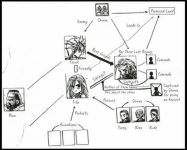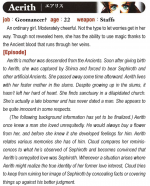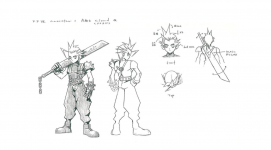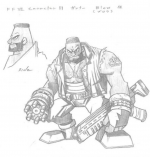It's always interesting when little facets of design process end up exposing themselves like this. Especially with RPGs where there are some locations that can be reached in any order, and some that are linear, it's always interesting to find things where the specific sequence of location events (which feel critical to the story we're familiar with) have details that show that they weren't set in stone nearly as early as it might seem, and have space for elements that would be impossible for when they appear.
I think that an over-focus on "agency of the decision to have Aerith die" is actually missing the forest for the trees insofar as what that theme is in the context of Sakaguchi's contribution in this case.
I've detailed a fair bit about Sakaguchi's experience with death shaping the story & being overtly reflected in Remake/Rebirth in another thread which hits on a lot of his lasting contributions that I don't want to just repeat here. One important thing is that this theme all started back in
Final Fantasy III. One of the bigger things is that even if he's not making the specific decisions about various story details, it's still his personal philosophical attempts to grapple with that kind of loss from personal experience that created the core of the story about the Lifestream itself.
Following along that line, one of the things that I think is worth mentioning is that non-material contributions are harder to gauge, but still just as important of
a REAL contribution to what the end product is. Sakaguchi's own life experiences are also worth noting, being that he's older ('62) than Nojima ('64), Kitase ('66), & Nomura ('70), and as he's using that as a foundation from which a lot of the world & story's more specific inspiration & iteration can still take place outside of his direct influence, when it comes to the roles of the writer, director, & artist being able to contribute to shaping that.
I've always seen that contribution of his as being basically the North Star as the point of guidance around the core of what
FFVII explores from an existential standpoint – and since those themes are heavily shaped by his own very unique philosophical outlook around those things from his experiences back then, it's hard to overstate how much he contributed to
Final Fantasy VII. The variability & nuances that Nojima, Kitasae, & Nomura tackle all match to what one would expect from their various roles with Nojima as the writer, Kitase as the director, & Nomura as the artist. It's also worth noting that this builds off of the foundation that Sakaguchi established
not JUST in FFVII, but with the general theme of death in earlier
Final Fantasy titles, meaning that both Nomura & Kitase would already be familiar with some of that, and be able to easily iterate in directions that explored those things differently than they had done before.
Given that that's why
FFVII is focused around the Lifestream, and it's both literally & metaphorically the lifeblood of the world in the story – everything that
Final Fantasy VII is wouldn't exist how it does without it. As the
Compilation has proved over the years – there's a lot of malleability with the various details in the game when it comes to how the characters look, and exactly what happened with them in various circumstances. However, I'd argue that the core themes of Sakaguchi's are still absolute & fundamental to how the narrative is shaped both in the original game, and in what came afterwards.
It's also worth looking at this in the general context of what we know about Sakaguchi's role in general at Square, and just how much of that was involved in other tasks. The section "
Sakaguchi leaves Square and the company begins to change" really helps to emphasize a lot of what that looked like from a business operational perspective.
It's ironically the EXTREME strength of that collective unity and ability to be a strong guiding force that ended up being the exact same thing that undermined translating that same operational mindset into
FF:TSW
(I think it's also a not insignificant impact to the struggle that we still see around the
Final Fantasy titles now, and especially with the modern "live-service" era of game monetization and things all attempting to offset this type of risk, even as the size & budgets of AAA games starts to get closer and closer to what happens with film production, but that's a bit of an aside that I just felt was worth highlighting).
Overally, that's why it's worth looking at what Sakaguchi's contributions to
Final Fantasy VII were from a bit of a different perspective than just attempting to compare them against the explicit details like around who technically decided that Aerith was going to die. Especially in looking at things like how they're different from things like what Nomura contributed, it's really necessary to also just emphasize the big difference in the roles that they had, and what to expect qualifies as a "contribution" to try and gauge that.
X 









